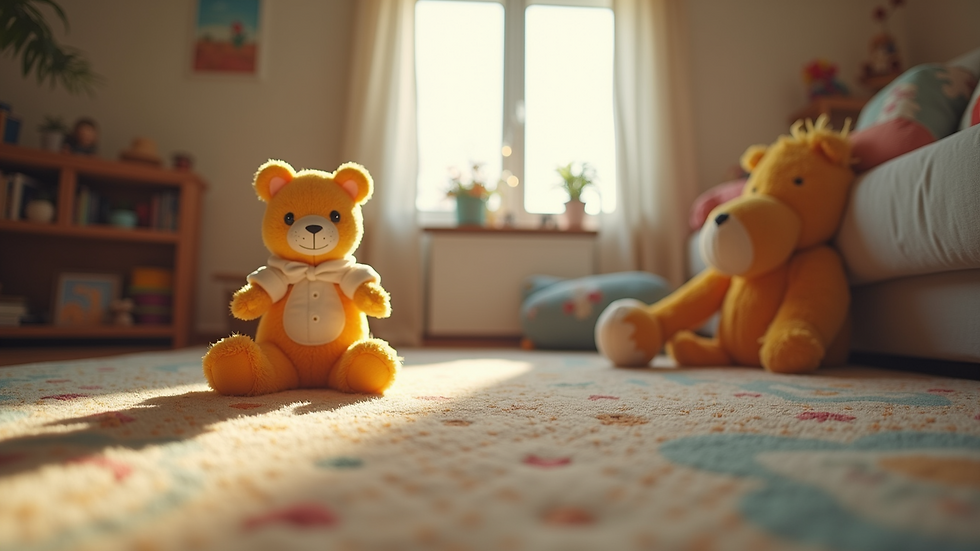The Friendships That Fade: Grieving Connection While Raising a Disabled Child
- H R
- Jul 30, 2025
- 4 min read
Updated: Dec 27, 2025
When I first received my child's diagnosis, it felt like I was entering a whirlwind. I remember standing in my kitchen, holding the phone to my ear, as my friend asked if I wanted to join her for a weekend getaway. My instinct was to say yes, but the words caught in my throat. I stared at the pile of therapy appointments and special education paperwork on the table, realizing that my new life was no longer compatible with spontaneous outings. In that moment, I understood that I wasn’t just saying no to an invitation—I was saying goodbye to a part of myself. This silent grief—infused with social isolation—is something many parents of children with disabilities experience but few discuss openly.
The Silent Grief of Parenting a Child with Disabilities
The statistics on social isolation among caregivers paint a stark picture. According to a 2021 study in Pediatrics, over 50 percent of parents of children with disabilities report feeling chronically lonely, compared to just 16 percent of parents of neurotypical children. Further, a survey published in the Journal of Intellectual Disability Research (2020) found that a staggering 72 percent of special needs caregivers lose significant friendships within the first five years of their child’s diagnosis. These numbers reflect a reality that parents rarely voice: the profound loneliness that accompanies raising a child with unique needs.
The Subtle Fade of Friendship
Friendships rarely end in a blazing conflict—instead, they dissolve gradually, like fog dissipating under the sun. “You used to be able to drop everything... Now? You can’t drop anything,” becomes a mantra of many parents lost in the shuffle of caregiving. The emotional toll can be heavy:
Social withdrawal
Fear of being misunderstood
Fatigue from explaining your life to others repeatedly
Each time I had to decline an invite, I felt a chunk of my social identity slip away. My friends, all well-meaning, would eventually stop asking altogether, and I found myself grappling with the grief of uninvited connections. The realization that I was on the outside looking in was heartbreaking.

The Psychological Toll of Isolation
Research backs up what many of us intuitively feel. A study in the Journal of Developmental & Behavioral Pediatrics (2018) notes that mothers of children with autism experience rates of clinical depression between 40-50%, with social isolation as a key contributor. This brings us to the idea of “ambiguous grief”—mourning something that’s not dead but lost, like a lifestyle full of ease and connection.
As those long nights ticked by, I often found myself lost in thought, wondering if anyone even noticed I was gone. The late-night musings could be suffocating, serving as harsh reminders of relationships that had faded.
Giving Yourself Grace: You’re Not the One Who Changed Wrong
It’s easy to slip into a cycle of self-blame when friendships fade. It’s vital to reframe this perspective with compassion. Your energy is spent keeping your child safe, thriving, and understood. Being exhausted or having shifted priorities doesn’t make you a bad friend—it makes you human.
As a friend once pointed out to me, “Keeping up takes an energy you just don’t have anymore.” This acknowledgment of your limitations can be freeing. It creates room for self-acceptance, allowing you to focus on what matters most—your child and your well-being.

Finding New Community: You’re Not Alone
Support Groups & Like-Minded Peers
Building a new community may feel daunting, but there are numerous resources available to assist you. Consider exploring national and local organizations:
The Arc
Parent to Parent USA
Easterseals
Facebook groups by diagnosis
Peer-led support can often provide validation and healing. A single new friend who “gets it” can be more nurturing than a dozen who do not understand your journey.
Community Involvement
You may also find connection through community involvement, partnering with local ABA clinics, therapy centers, and SPED school districts. Organizing events like:
Parent socials
Parent nights
Coffee & connection mornings
can cultivate new friendships. Make it easy for other parents to attend by providing respite or childcare, and promote events with clear, low-pressure messaging: “Come as you are. Stay as long as you can.”
Making Room for the Friends Who Stay
“Sometimes, someone new will step right into your chaos—and choose not to leave.” These people are the treasures in your life—the friends willing to adapt and grow alongside you. Here are some ideas to maintain those connections:
Monthly check-in texts to show you’re thinking of them
Low-stimulation hangouts to accommodate your needs
Friends who come to your home instead of insisting you go out
Consider conditioning your friendships around small, sacred interactions rather than grand gestures. Sometimes, it's the little things—a message or a shared meme—that means the most.

Reimagining Connection: It Doesn’t Have to Look the Same
Friendship doesn’t have to look the same as it once did. Embrace the new normal by:
Sending memes instead of lengthy conversations
Understanding that rhythms of connection may slow down
Redefining “showing up” in emotional terms, rather than physical ones
Some friendships won’t survive the transition, and that’s okay. It’s a natural phase of life, and if something isn’t flourishing, it may be time to let go.
There Is Still Room for Joy
Yes, it can be hard to face the fact that some friendships fade. With that said, there are still friendships that endure and new ones that form. The power of chosen family emerges from the aftermath of loss and loneliness, reminding you that “You are not forgotten. You are not invisible. You are still worthy of community.”
The journey may be lonely at times, but there is still hope. You possess the strength to embrace new connections and cultivate relationships that honor your experiences. Remember, the bonds you create may surprise you with their depth and understanding.






Comments